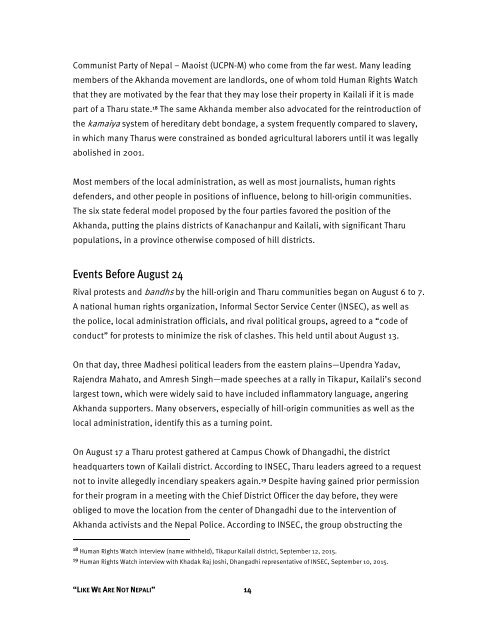“Like We Are Not Nepali”
nepal1015_forupload
nepal1015_forupload
You also want an ePaper? Increase the reach of your titles
YUMPU automatically turns print PDFs into web optimized ePapers that Google loves.
Communist Party of Nepal – Maoist (UCPN-M) who come from the far west. Many leading<br />
members of the Akhanda movement are landlords, one of whom told Human Rights Watch<br />
that they are motivated by the fear that they may lose their property in Kailali if it is made<br />
part of a Tharu state. 18 The same Akhanda member also advocated for the reintroduction of<br />
the kamaiya system of hereditary debt bondage, a system frequently compared to slavery,<br />
in which many Tharus were constrained as bonded agricultural laborers until it was legally<br />
abolished in 2001.<br />
Most members of the local administration, as well as most journalists, human rights<br />
defenders, and other people in positions of influence, belong to hill-origin communities.<br />
The six state federal model proposed by the four parties favored the position of the<br />
Akhanda, putting the plains districts of Kanachanpur and Kailali, with significant Tharu<br />
populations, in a province otherwise composed of hill districts.<br />
Events Before August 24<br />
Rival protests and bandhs by the hill-origin and Tharu communities began on August 6 to 7.<br />
A national human rights organization, Informal Sector Service Center (INSEC), as well as<br />
the police, local administration officials, and rival political groups, agreed to a “code of<br />
conduct” for protests to minimize the risk of clashes. This held until about August 13.<br />
On that day, three Madhesi political leaders from the eastern plains—Upendra Yadav,<br />
Rajendra Mahato, and Amresh Singh—made speeches at a rally in Tikapur, Kailali’s second<br />
largest town, which were widely said to have included inflammatory language, angering<br />
Akhanda supporters. Many observers, especially of hill-origin communities as well as the<br />
local administration, identify this as a turning point.<br />
On August 17 a Tharu protest gathered at Campus Chowk of Dhangadhi, the district<br />
headquarters town of Kailali district. According to INSEC, Tharu leaders agreed to a request<br />
not to invite allegedly incendiary speakers again. 19 Despite having gained prior permission<br />
for their program in a meeting with the Chief District Officer the day before, they were<br />
obliged to move the location from the center of Dhangadhi due to the intervention of<br />
Akhanda activists and the Nepal Police. According to INSEC, the group obstructing the<br />
18 Human Rights Watch interview (name withheld), Tikapur Kailali district, September 12, 2015.<br />
19 Human Rights Watch interview with Khadak Raj Joshi, Dhangadhi representative of INSEC, September 10, 2015.<br />
“LIKE WE ARE NOT NEPALI” 14


